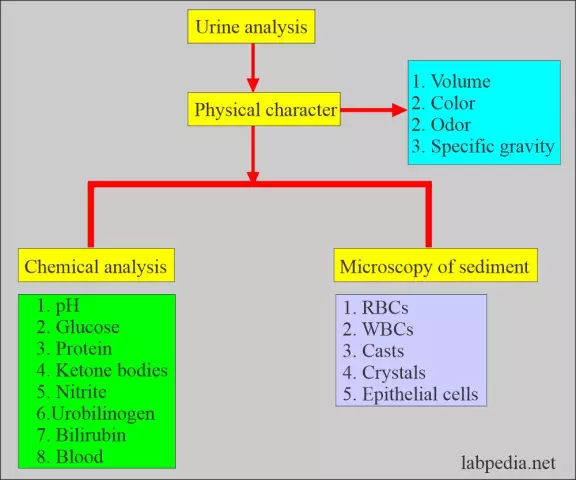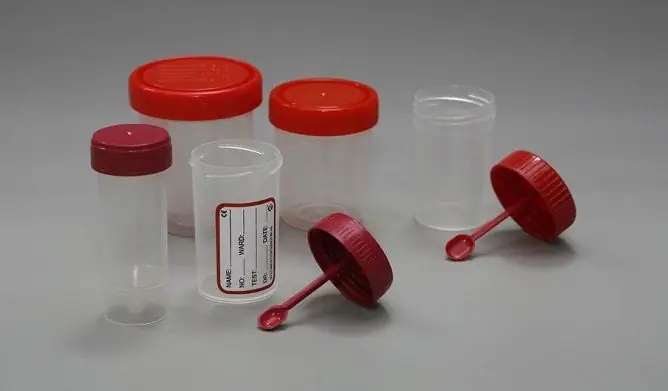- Author Rachel Wainwright wainwright@abchealthonline.com.
- Public 2023-12-15 07:39.
- Last modified 2025-11-02 20:14.
Stool analysis

The study of feces is carried out to identify diseases of the digestive system: stomach, liver, pancreatic gland, inflammation in the gastrointestinal tract, disorders of the absorption of nutrients in the small intestine, duodenum.
After detecting diseases and prescribing treatment, the analysis of feces is repeated to assess the effectiveness of therapy.
Examining feces, pay attention to the following indicators:
- consistency - feces should be shaped and firm. Liquid feces indicate enteritis, colitis; ointment - for the absence of bile, disruption of the pancreas; mushy - for colitis with diarrhea, chronic enteritis, fermentative dyspepsia; frothy - fermentative colitis; ovine colitis, accompanied by constipation; ribbon-like feces occur with hemorrhoids, tumors of the rectum or sigmoid colon, spasm of the sphincter;
- color - feces should be brown, because it contains stercobilin. If the stool is black, it indicates the presence of bleeding in the gastrointestinal tract; brown light feces - for accelerated evacuation of feces from the rectum; yellow - for fermentation dyspepsia, poor digestion of food in the small intestine; reddish - for colitis with ulcers; light yellow or gray - for pancreatic insufficiency; white - for stagnation of the bile duct;
- smell - it is caused by the presence of decay products in the feces. A putrid odor speaks of ulcerative colitis, insufficiency of digestion in the stomach; weak - about constipation, insufficiency of digestion in the large intestine; the smell of rancid oil indicates problems with the flow of bile, a violation of the secretion of the pancreas; sour odor in feces can be with fermentative dyspepsia;
- The pH of the stool should be slightly alkaline or neutral;
- bilirubin, soluble protein, neutral fats, fatty acids, digestible fiber, starch, leukocytes, erythrocytes, crystals should not be;
- there should be no muscle fibers and salts of fatty acids at all, but a small amount is allowed.
Preparation for analysis
Feces are not suitable for research after cleansing enemas, the use of rectal suppositories, laxatives.
The feces collected for analysis should be free of urine, disinfectants.
Two days before the analysis, the patient must stop taking medications that affect the function of the gastrointestinal tract, pilocarpine, belladonna tincture, as well as those containing iron, dyes, barium, bismuth.
In addition to general research, feces are often analyzed for dysbiosis, feces for worms and blood are analyzed.
Stool analysis for worms
Most often, this analysis of feces is taken from children - when registering them in health-improving and educational institutions, for preventive purposes during the professional examination of schoolchildren and children in kindergartens. The most common cause of helminthiasis is the lack of personal hygiene. It is believed that this is one of the diseases of "dirty hands", so the analysis of feces in children for helminthiasis should be carried out regularly.
In addition, children and adults are examined before hospitalization, in the presence of symptoms accompanying the infection with worms.
It is not required to carry out special preparation before passing the analysis of feces for worms, feces are collected and handed over, based on generally accepted rules. Normally, the eggs of worms should not be in the feces.
Analysis of feces for dysbiosis
To study the intestinal microflora, the feces are checked for dysbiosis. When making an analysis, the content and ratio of harmless bacteria are assessed: lactobacilli, bifidobacteria, opportunistic bacteria: fungi, clostridia, enterobacteria, staphylococci, E. coli and pathogenic bacteria - salmonella, shigella, etc.
Normally, the last two groups of microorganisms should be less than bacteria from the first group.
It is recommended to analyze feces for dysbiosis with unstable stools - frequent constipation and diarrhea, with flatulence, discomfort and abdominal pain, frequent skin rashes, intolerance to a number of foods, intestinal infections, with prolonged use of hormones and anti-inflammatory drugs.
Such an analysis of feces is also carried out in children, newborns at risk, adolescents suffering from frequent respiratory infections, allergies.
Fecal blood test
The study is prescribed if there is a suspicion of bleeding in the gastrointestinal tract - to detect blood that is not visible during microscopic examination.
Occult blood is determined in the analysis of feces with bleeding from the gums, veins of the stomach, esophagus, intestines, with inflammation and ulcers in the intestine and stomach, hemorrhagic diathesis, polyposis of the intestinal mucosa.
In addition to the usual preparation, for the analysis of feces for blood, the patient must adhere to a special diet - exclude fish, liver, apples, spinach, meat, green onions, green vegetables, bell peppers, horseradish, beets, white beans, tomatoes 3 days before the analysis, pomegranates, blueberries, abolish medications containing iron. It is preferable to use milk, white bread with butter, porridge, mashed potatoes, boiled soft-boiled eggs, a small amount of fresh fruit. Due to the possibility of gum damage, it is not recommended to brush your teeth for two days before the test.
Found a mistake in the text? Select it and press Ctrl + Enter.






